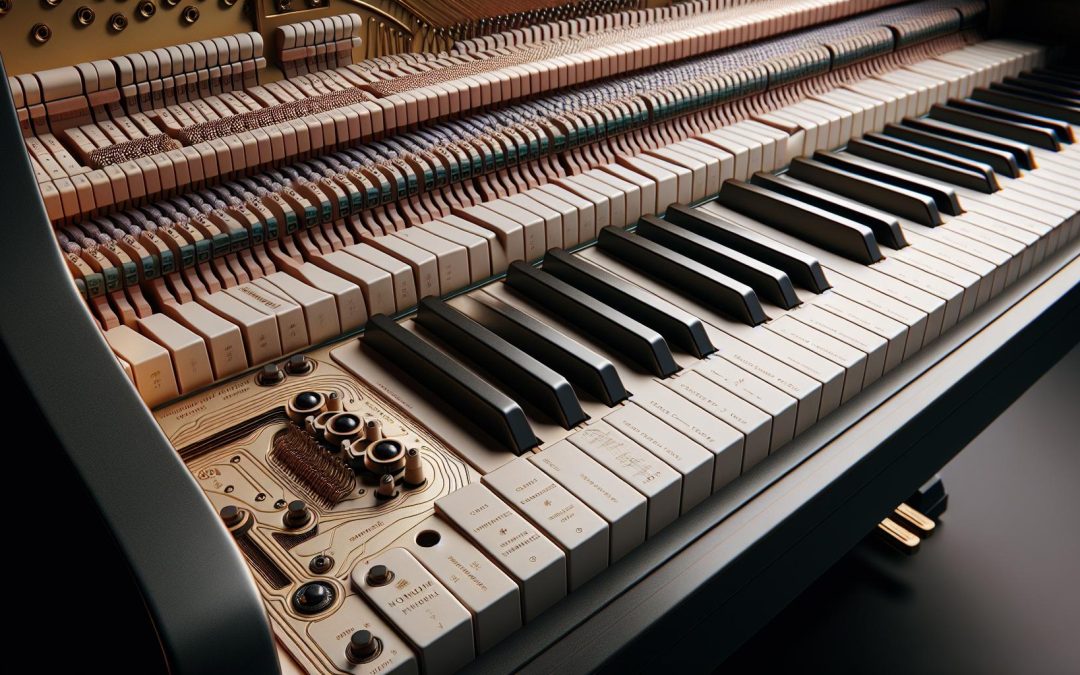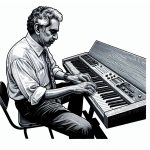When you're a pro, you need the right tools. That's where the full-size piano keyboard comes into play. It's not just a luxury, but a necessity for those serious about their craft. With its full range of 88 keys, it offers the complete spectrum of sound that professionals need to deliver stunning performances.
Choosing the right full-size keyboard can be a game-changer. It's not just about the number of keys, but also the quality of sound, the feel of the keys, and the overall build of the instrument. This isn't about getting by, it's about excellence and achieving the highest level of performance.
So, whether you're a seasoned concert pianist or a studio musician, the full-size piano keyboard is your ticket to a world of musical possibilities. Let's dive in and explore why it's the top choice for professionals.
Benefits of a Full-Size Piano Keyboard
Undoubtedly, a full-size piano keyboard is more than just an oversized musical gadget for professionals. Its unique perks make it indispensable in the hands of those who dare to strive for acoustic perfection.
One of the major benefits of a full-size piano keyboard is its huge range. Unlike smaller keyboards, it boasts a whopping 88 keys, providing an extensive spectrum of sound that allows for deeper expression and more dynamic performances. It essentially gives musicians the freedom to explore and indulge in the massive universe of sound, giving them the luxury of choice that's crucial in creating majestic and soul-touching music.
Moreover, playing on a full-size keyboard gives musicians a real piano feel. You'd love the weight and resistance each key offers, mimicking an acoustic piano's feel. It's not just about the sound; it's also about the feel under their fingertips that adds to the playability and overall experience.
And let's not forget the boost in sound quality. With a full-size keyboard, you're looking at a richer tone, a broader dynamic range, and an all-around superior sound. Remember, this isn't just a matter of playing notes; it's about capturing the soul of music.
Another significant benefit is the professional touch a full-size keyboard provides. It gives musicians' performances the authenticity that smaller keyboards often fail to deliver. As professionals, musicians always aim to impress, and playing on a full-size keyboard displays their seriousness towards their craft, not as a hobby but as a lifestyle.
Finally, when it comes to durability, full-size keyboards are generally more robust and well-built. They're designed to endure the rigorous commands of professional use, taking every high energy performance in stride.
These are just a handful of the benefits that a full-size piano keyboard offers. Surely, it amplifies the musicianship spirit, imposing no limits on creativity, flexibility, and overall musical expression. So, the investment in such a keyboard is not just for the look; it's about choosing a tool that complements and enhances a musician's skillset.
Key Features to Look for in a Professional Keyboard

When selecting a professional keyboard, it isn't just about the size or number of keys. There's a variety of characteristics that differentiate a professional-grade keyboard from an amateur one.
Firstly, touch sensitivity is a crucial aspect. It refers to the response of a keyboard to the force or speed applied to the keys during play. This allows for a wide range of expression, mirroring the dynamics of an actual acoustic piano. A high-quality keyboard will respond perceptibly when played softly or forcefully, translating these nuances into volume and tone variations.
Another noteworthy feature is the weighted keys. The resistance provided by weighted keys imitates the feel of playing an acoustic piano. They're heavier in the lower notes and lighter in the higher registers, mimicking the hammer mechanisms in traditional pianos. This gives musicians a tactile experience, facilitating an emotional connection to their music.
Additionally, a crucial feature is the sound quality. The keyboard should be able to reproduce the rich and expansive range of grand piano tones. This includes the resonance and the overtones that create the complexity of a concert piano sound. High-quality keyboards utilize advanced technologies to recreate these acoustic properties.
A handy feature to consider is portability. Though a full-size keyboard offers a comprehensive music experience, it should also be easy to move and pack. This is a must-have for touring musicians and those who perform at multiple venues.
Another main feature is its durability. A professional keyboard is a considerable investment, and it should withstand the rigors of constant use.
Lastly, professionals should look for full-size keyboards with broad sound libraries and editing features. These enhance the musician's adaptability and creative possibilities. It should cater to diverse music genres, from classical to jazz to pop.
Specifications for professional keyboards:
| Key Feature | Description |
|---|---|
| Touch Sensitivity | Should respond to force variations |
| Weighted Keys | Should mimic acoustic piano mechanisms |
| Sound Quality | Must reproduce rich piano tones |
| Portability | Should be easy to move |
| Durability | Must withstand regular heavy use |
| Sound Libraries & Editing | Support diverse music genres |
A professional keyboard isn't just about the sound or functionality. It's also an extension of the musician's identity, and finding the right one is an essential part of their musical journey. Keep these features in mind while hunting for that perfect keyboard.
The Importance of 88 Keys for Professional Use

When it comes to selecting a professional-grade keyboard, one of the critical deciding factors is the number of keys. 88 keys have become a gold standard in the industry - and for good reason.
Many might ask, "Why 88 keys?" Well, it all boils down to range and versatility. The magic of having a full-size piano keyboard with 88 keys rests in its ability to provide a complete range of musical notes - 7 octaves plus a minor third. This wide span allows a keyboardist to play practically any piece of music, a significant advantage when working in the professional field. At professional levels, musicians never know what they might be called upon to perform, so having the full scale of options under their fingers makes a world of difference. The versatility of 88 keys can take the musician's creativity to new heights, allowing them to explore new melodies and harmonies.
On top of that, there's something inherently satisfying about playing a keyboard with a full range of keys, as it gives a complete and tactile response. This natural 'feel' is essential to many keyboardists as it reflects one's unique musical style and identity.
Of course, there's the tonality factor. With 88 keys, you'll have the opportunity to dive into the rich, deep bass notes, ascend to the piercing high notes, and everything in between. This spectrum of sound brings a depth and richness to the music that's hard to achieve with a lesser number of keys.
Remember, a keyboard isn't just about hitting the right notes - it's about expressing the music inside you. There is no better way to accomplish this than opting for a full 88-key keyboard. With these points in mind, it becomes clear that the 88 keys aren't just numbers, but the gate to a world of musical possibilities.
Finding the Perfect Sound Quality

When it comes to professional-grade keyboards, simply having 88 keys doesn't cut it. It's about finding that perfect sound quality too. Skilled musicians are well aware that the choice of keyboard plays a significant role in the tonal quality of their compositions. And full-size keyboards are known for their superior sound replication.
One of the biggest perks of a professional-grade keyboard with 88 keys is the faithful reproduction of acoustic piano sounds. The gap between digital and acoustic pianos has narrowed considerably in recent years, thanks to advanced technology. The rich tonal variations and dynamic range captured by these full-sized keyboards are compelling enough to even please the purists.
Another critical aspect lies in the keyboard's response. Many digital keyboards with fewer keys often lack the necessary touch sensitivity or key action to convey the subtilties of a musical performance. 88-key professional keyboards often offer graded hammer action keys that meticulously replicate the mechanical nuances of an acoustic piano, affecting the volume, pitch, and decays of the notes played.
Sample some notable keyboard models with their notable features:
| Keyboard Model | Notable Feature |
|---|---|
| Yamaha YDP-184 | CFX Premium Grand Piano Tone |
| Roland FP-90 | Progressive Hammer Action Keys |
| Casio GP-500BK | Acoustic Grand Piano Sound Reproduction |
But it's not all about realism. A superior keyboard will offer a range of sounds beyond just those found on an acoustic piano. They’d include electric piano tones, organ, strings, synth sounds, and more. Expanding the array of sounds at the fingertips of a musician allows them to explore new soundscapes, thus enhancing their creativity.
With the right combination of a complete range of 88 keys and high-quality sound, a full-size keyboard can truly unlock a world of musical possibilities. These keyboards not only provide musicians with the necessary tools to accurately interpret a musical score but also to articulate their personal musical expressions.
So, while an 88-key keyboard brings the full spectrum of notes to the table, it's also about transcending beyond mere tones to truly express the music inside the musician.
The Importance of Key Action and Sensitivity

In the world of professional music, key action and sensitivity aren't just terms tossed around by enthusiasts. They're crucial components of a performance-grade keyboard. These aspects go beyond the number of keys and delve deeper into the sensory experience that the instrument provides to the player.
Take graded hammer action keys as an example. They're designed to replicate the tactile feedback of an acoustic piano, adding another layer to the instrument's authenticity. This feature provides a nuanced response to each keystroke, varying by the strength and speed of the player's touch. It doesn't only make the playing experience more immersive but also opens up opportunities for musicians to express their artistic intentions more accurately.
The sensitivity of a keyboard is another feature that serious musicians shouldn't overlook. It's an element that contributes to providing a more realistic and satisfying playing experience. Ideally, a professional-grade keyboard should have touch sensitivity that mimics a real acoustic piano. This detail does wonders in terms of enabling more nuanced performances and more expressive musical pieces.
The response of the keys and their sensitivity profoundly affect the musical output of a keyboard. As such, when considering a professional-grade keyboard, one can't underestimate these factors. Whether it's for live performances, studio work, or composing, a keyboard's key action and sensitivity are more than just specs – they're the features that can transform a good piano performance into an extraordinary one.
Many industry standards offer key action and sensitivity agreed upon by professionals globally. Some keyboard models such as Yamaha's Clavinova series and Kawai's CA series digital pianos are notable examples. These brands focus on delivering instruments that closely mirror an acoustic piano's feel and response, demonstrating the importance they place on key action and sensitivity.
So, next time when looking to enhance your musical experience, remember that there's more to it than just the size or quality of sound. It's also about how the keys respond to the musician's touch.
Durability and Build Quality: Why it Matters

When it comes to professional-grade keyboards, the build quality and durability are just as important as the key action and sensitivity. Wood-framed cabinets or metal chassis are often the tell-tale signs of a well-constructed keyboard, as they not only add to the longevity but also enhance the stability of the instrument.
Materials used for the keys impact a keyboard's lifespan. For instance, keyboards with plastic keys are less expensive, but may not endure rigorous, continuous use. On the other hand, synthetic ivory or ebony keys have proven to stand the test of time and use, even under tough playing conditions. They offer the closest feel to acoustic piano keys, enhancing the keyboard's overall playability.
Focusing on the hardware is another vital aspect of durability. For example, the joints, screws and bolts should also be firmly attached without loose or shaky parts. The build quality extends to the onboard controls and connectors. These include the pitch and modulation wheels, sliders and buttons, and MIDI or audio connectors. It's essential that these components are tough enough to withstand heavy use without breaking or losing their functionality.
Renowned brands like Yamaha's Clavinova series, and Kawai's CA series demonstrate exceptional craftsmanship, combining robust build quality with excellent key action and touch sensitivity. They are not only built sturdy on the inside but also have a robust exterior that is aesthetically pleasing.
Updates and maintenance can also prolong the life of a keyboard. Regular cleaning, timely firmware updates, and necessary repairs will ensure the instrument remains in optimal condition. This reduces any chances of playing mishaps and maintains the quality of sound.
Performance is a significant factor for professional musicians, but durability is crucial, too. A keyboard can feel fantastic for a few months, but if it's not built to withstand the rigors of constant use, it might wear out quickly. So choose wisely when you decide to purchase a full-size keyboard for professional use.
Comparing the Top Full-Size Keyboard Brands

As we venture further into technical specifics of full-size keyboards it's key to highlight some of the industry's leading brands. These industry giants have set high standards in key action, built quality, and touch sensitivity.
First on our list is the Yamaha Corporation. Yamaha's Clavinova series, well-known for its graded hammer action keys, offers an authentic piano experience. Interestingly there's a progressive gradient heavier to lighter from lower to higher keys. This mimics the exact patter of traditional acoustic pianos. It doesn't end there. Yamaha has also done an excellent job in imbibing touch sensitivity into its keyboards. As a perk, they are remarkably durable with a robust exterior design ensuring their longevity.
Then there's Kawai, another top-tier keyboard manufacturer. Kawai's CA series is equally lauded for its top-notch key action and sensitivity. One unique aspect is the use of their proprietary “Grand Feel II” wooden-key action, offering responsive hammer action. What stands out is their use of synthetic ivory and ebony for their keys enhancing both the tactile experience and the keyboard's lifespan.
No conversation about full-size keyboards would be complete without mentioning Roland Corporation. Known for its innovative design and cutting-edge technology, Roland's keyboards stand out. Their RD series showcases an impressive combination of fully weighted keys and premium sounds providing players with an immersive experience. Plus, it's worth mentioning Roland’s remarkable durability and solid build.
Another noteworthy brand is Casio. Their Privia series is adored for both affordability and performance. Despite being priced lower than some premium models, Casio manages to deliver impressive touch sensitivity and weighted action. Their keyboards are also built to last with high durability.
These top-tier brands each bring something unique to the full-size keyboard market. Their emphasis on key action, touch sensitivity, and robust design show dedication to create the best professional-grade keyboards. However, the choice will ultimately come down to individual preference. So it's always wise to test several models before settling down to the perfect fit.
Conclusion
Choosing a full-size piano keyboard for professional use isn't a one-size-fits-all solution. It's about finding the right balance between key action, touch sensitivity, and build quality. Whether it's the graded hammer action keys of Yamaha's Clavinova series, the "Grand Feel II" wooden-key action of Kawai's CA series, the fully weighted keys of Roland's RD series, or the affordable touch sensitivity of Casio's Privia series, there's something for everyone. Remember, each model has its unique strengths and it's crucial to test multiple ones to find that perfect match. It's like finding a dance partner - the right connection can lead to a beautiful performance. So, don't rush it. Take your time to find the keyboard that feels right under your fingers and makes your music come alive.
Harlan Kilstein began playing piano during covid with no piano background at all. He taught himself how to play learning what to do and what not to do.
Today he's an advanced intermediate player and can help you grow in your skills because he learned all this on his own.








